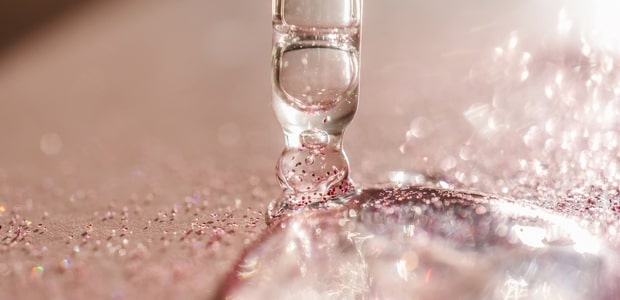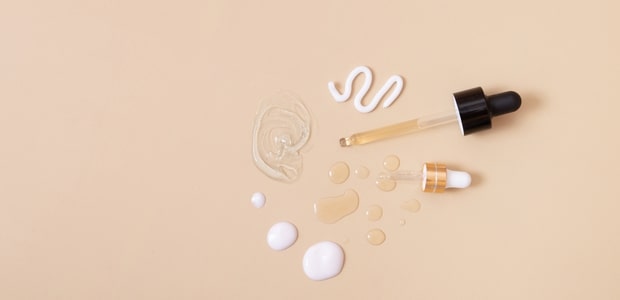Peptides: Benefits, Risks, and More
Table of Contents:[hide]
Introduction
Peptides are short chains of amino acids that are essential building blocks of proteins in the human body. In skincare, peptides are used as active ingredients to stimulate collagen production, promote cell growth, and improve skin texture and tone. Peptides can offer a range of benefits for the skin, including reducing the appearance of fine lines and wrinkles, improving skin firmness, and promoting a more youthful complexion.
This article will explore the benefits and risks of using peptides in skincare, including which peptides are best for the skin and whether they really work. We'll also compare peptides with other popular skincare ingredients, such as hyaluronic acid, and discuss the potential side effects and risks of using peptides in your skincare routine. Additionally, we'll cover at what age you should start using peptides, how long they take to work, and which peptides are considered the most effective for achieving youthful, rejuvenated skin.
What are Peptides?

► Definition and Explanation of Peptides
Peptides are short chains of amino acids, which are the building blocks of proteins in the human body. They can be found naturally in the skin and play an important role in the maintenance and repair of skin tissue. In skincare, peptides are used as active ingredients to promote collagen production, improve skin texture and tone, and reduce the appearance of fine lines and wrinkles.
► How Peptides Work in the Body
Peptides work in the body by signaling to cells and tissues to perform specific functions. For example, peptides can signal to skin cells to produce more collagen, which is essential for maintaining skin elasticity and firmness. By increasing collagen production, peptides can help to reduce the appearance of fine lines and wrinkles and promote a more youthful complexion.
► How Peptides Work in Skincare Products
In skincare products, peptides are formulated to penetrate the skin and deliver their beneficial effects. Peptides work by stimulating collagen production, improving skin texture and tone, and reducing the appearance of fine lines and wrinkles. They can also promote cell growth and repair, which can help to rejuvenate the skin and restore a more youthful appearance.
► The Different Types of Peptides and their Functions
There are many different types of peptides used in skincare products, each with their own unique functions. Some of the most common types of peptides used in skincare include:
Copper peptides: these are known for their anti-aging properties and can help to promote collagen production, improve skin texture and tone, and reduce the appearance of fine lines and wrinkles.
Matrixyl peptides: these can help to stimulate collagen production and improve skin firmness, making them effective for reducing the signs of aging.
Palmitoyl peptides: these can help to promote collagen production and improve skin elasticity, making them effective for reducing the appearance of fine lines and wrinkles.
Hexapeptide: this peptide is known for its ability to relax facial muscles, making it effective for reducing the appearance of expression lines and wrinkles.
By choosing the right type of peptide for your skin concerns, you can achieve maximum benefits and improve the overall health and appearance of your skin.
Benefits of Peptides in Skincare

► Anti-aging Benefits of Peptides
Peptides are known for their powerful anti-aging benefits. They can help to promote collagen production, which is essential for maintaining skin elasticity and firmness. By increasing collagen production, peptides can help to reduce the appearance of fine lines and wrinkles and promote a more youthful complexion. Additionally, peptides can help to protect the skin from oxidative damage caused by free radicals, which can contribute to the signs of aging.
► Promotion of Collagen Production
Collagen is a protein that gives skin its elasticity and firmness. As we age, collagen production slows down, leading to the formation of fine lines and wrinkles. Peptides can help to promote collagen production, which can help to restore the skin's natural elasticity and firmness. By using skincare products containing peptides, you can help to maintain and improve the health and appearance of your skin.
► Reduction of Fine Lines and Wrinkles
One of the most significant benefits of peptides in skincare is their ability to reduce the appearance of fine lines and wrinkles. Peptides work by stimulating collagen production, which can help to smooth out fine lines and wrinkles and improve skin texture. Over time, regular use of peptides in skincare products can help to improve the overall appearance of the skin, making it look smoother, firmer, and more youthful.
► Rejuvenation of Skin
Peptides can help to rejuvenate the skin by promoting cell growth and repair. They can help to stimulate the production of new skin cells, which can help to improve the overall texture and tone of the skin. By using peptides in skincare products, you can help to restore the skin's natural radiance and vitality.
► Improvement of Skin Texture and Tone
Peptides can also help to improve the texture and tone of the skin. By stimulating collagen production, peptides can help to improve skin elasticity and firmness, making the skin look smoother and more toned. Additionally, peptides can help to reduce the appearance of age spots and other pigmentation issues, leading to a more even skin tone and a brighter complexion.
Overall, the benefits of peptides in skincare are numerous and significant. By using skincare products containing peptides, you can help to maintain and improve the health and appearance of your skin, reducing the signs of aging and promoting a more youthful, radiant complexion.
Risks and Side Effects of Peptides in Skincare

► Potential Side Effects of Peptides
While peptides are generally considered safe for use in skincare products, there are a few potential side effects to be aware of. These may include skin irritation, redness, and itching, particularly for those with sensitive skin. It's essential to test a small amount of any new skincare product containing peptides on a small area of skin before using it all over your face or body.
► Risks Associated with Using Peptides in Skincare Products
There are also a few risks associated with using peptides in skincare products, particularly when they are not used correctly. For example, using a product containing a high concentration of peptides may lead to skin irritation, particularly if you have sensitive skin. Additionally, some peptides may interact with other skincare products or medications, so it's essential to speak with a healthcare professional or dermatologist before adding peptides to your skincare routine.
► How to Avoid Potential Risks and Side Effects
To avoid potential risks and side effects associated with peptides in skincare, it's essential to choose products that are formulated with high-quality, safe ingredients. Look for skincare products that have been tested for safety and efficacy and that contain a low concentration of peptides to reduce the risk of skin irritation. Additionally, always patch test new products on a small area of skin before using them all over your face or body.
Overall, peptides are generally safe for use in skincare products and offer a range of significant benefits. However, it's essential to be aware of the potential risks and side effects and take steps to avoid them by choosing safe, high-quality products and using them correctly. If you have any concerns about using peptides in your skincare routine, speak with a healthcare professional or dermatologist for advice.
Comparison of Peptides and Hyaluronic Acid

► Explanation of Hyaluronic Acid and its Benefits in Skincare
Hyaluronic acid is a naturally occurring substance in our skin that helps to retain moisture and keep our skin plump and hydrated. It is a popular ingredient in skincare products due to its ability to attract and hold water, making it an excellent hydrator for all skin types. Hyaluronic acid can also help to reduce the appearance of fine lines and wrinkles by plumping up the skin.
► Comparison of Peptides and Hyaluronic Acid
While peptides and hyaluronic acid are both popular ingredients in skincare products, they work in different ways. Peptides are amino acids that help to stimulate collagen production and promote cell turnover, while hyaluronic acid works to hydrate and plump up the skin. Both peptides and hyaluronic acid can help to reduce the appearance of fine lines and wrinkles, but they work in different ways to achieve this goal.
► Which is Better for Skincare: Peptides or Hyaluronic Acid?
The choice between peptides and hyaluronic acid depends on your individual skincare concerns and goals. If you are looking to reduce the appearance of fine lines and wrinkles and improve the overall texture and tone of your skin, peptides may be the better choice for you. If you are looking for a hydrating ingredient to plump up your skin and improve its overall moisture levels, hyaluronic acid may be the better choice. Ultimately, both peptides and hyaluronic acid can be beneficial for the skin and can be used together in a skincare routine for maximum benefits.
Best Peptides for Skincare

► The Most Effective Peptides for Skincare
There are many different types of peptides used in skincare products, but some are more effective than others. Here are some of the most effective peptides for skincare:
Matrixyl: Matrixyl is a peptide that helps to stimulate collagen production and improve skin elasticity, making it a popular ingredient in anti-aging skincare products.
Copper Peptides: Copper peptides, such as GHK-Cu, have been shown to have antioxidant and anti-inflammatory properties, making them effective for reducing the appearance of fine lines and wrinkles.
Palmitoyl Oligopeptide: This peptide helps to stimulate collagen production and promote cell turnover, making it effective for reducing the appearance of fine lines and wrinkles and improving skin texture.
Acetyl Hexapeptide-8: Also known as "Botox in a bottle," this peptide helps to relax facial muscles and reduce the appearance of wrinkles, making it popular in anti-aging skincare products.
► The Benefits of Each Peptide
Each peptide has its own unique benefits for the skin. Matrixyl helps to stimulate collagen production and improve skin elasticity, while copper peptides have antioxidant and anti-inflammatory properties, making them effective for reducing the appearance of fine lines and wrinkles. Palmitoyl Oligopeptide helps to promote cell turnover and improve skin texture, while Acetyl Hexapeptide-8 helps to relax facial muscles and reduce the appearance of wrinkles.
► How to Incorporate Peptides into Your Skincare Routine
Peptides can be incorporated into your skincare routine in a variety of ways, such as through serums, creams, and masks. When using a peptide-containing product, it's important to follow the instructions carefully and apply the product as directed. Peptides are most effective when used consistently over time, so it's important to incorporate them into your daily skincare routine for maximum benefits.
When to Start Using Peptides in Your Skincare Routine

As we age, our skin loses collagen and elasticity, resulting in fine lines, wrinkles, and sagging skin. Peptides can help to reverse some of these signs of aging, but when should you start using them in your skincare routine? Here's what you need to know:
► The effects of aging on the skin
As we age, the natural production of collagen and elastin slows down, causing the skin to lose its firmness and elasticity. This, in turn, leads to fine lines, wrinkles, and sagging skin. Exposure to environmental stressors like sun damage, pollution, and smoking can accelerate the aging process, making these signs of aging more pronounced.
► At what age should you start using peptides in your skincare routine?
There is no set age at which you should start using peptides in your skincare routine, as everyone's skin is different. However, it's generally recommended to start using anti-aging products in your mid to late twenties to help slow down the signs of aging before they become more pronounced. Peptides can be an effective way to help combat signs of aging like fine lines, wrinkles, and loss of firmness.
► The benefits of starting early
Starting to use peptides in your skincare routine early on can help to prevent the signs of aging from becoming more pronounced. By promoting collagen production, peptides can help to keep the skin looking firm and youthful. Using peptides regularly can also help to improve skin texture and tone, and reduce the appearance of fine lines and wrinkles.
In conclusion, incorporating peptides into your skincare routine early on can help to prevent and reduce the signs of aging, and keep your skin looking firm and youthful. However, it's important to remember that everyone's skin is different, so it's best to consult with a skincare professional to determine the best approach for your individual needs.
Conclusion
Peptides have become increasingly popular in skincare products due to their ability to promote collagen production, reduce fine lines and wrinkles, and improve skin texture and tone. While peptides have many benefits for the skin, there are also potential risks and side effects to be aware of.
It is important to choose high-quality products that contain safe and effective peptides, and to follow recommended usage guidelines. It's also important to consult with a dermatologist before incorporating peptides into your skincare routine, especially if you have sensitive skin or are prone to allergies.
Overall, peptides can be a great addition to your skincare routine, particularly if you're concerned about aging skin. By choosing the right peptides and using them consistently, you can help rejuvenate your skin and achieve a more youthful, radiant complexion.
References:
- Peptides as Active Ingredients: A Challenge for Cosmeceutical Industry. Chem Biodivers. 2021 Feb;18(2):e2000833. doi: 10.1002/cbdv.202000833.
- Role of topical peptides in preventing or treating aged skin. Int J Cosmet Sci. 2009 Oct;31(5):327-45. doi: 10.1111/j.1468-2494.2009.00490.x. Epub 2009 Jun 30.
- Hyaluronic acid: A key molecule in skin aging. Dermatoendocrinol. 2012 Jul 1; 4(3): 253–258. doi: 10.4161/derm.21923
- Topical Peptide Treatments with Effective Anti-Aging Results. Beldio Research GmbH; Kramerstrasse 15, 87700 Memmingen, Germany. Cosmetics 2017, 4(2), 16
- Anti-Wrinkle Benefits of Peptides Complex Stimulating Skin Basement Membrane Proteins Expression. Int J Mol Sci. 2020 Jan; 21(1): 73. Published online 2019 Dec 20. doi: 10.3390/ijms21010073
- Regenerative and Protective Actions of the GHK-Cu Peptide in the Light of the New Gene Data. Int J Mol Sci. 2018 Jul; 19(7): 1987. Published online 2018 Jul 7. doi: 10.3390/ijms19071987
- GHK Peptide as a Natural Modulator of Multiple Cellular Pathways in Skin Regeneration. Biomed Res Int. 2015; 2015: 648108. Published online 2015 Jul 7. doi: 10.1155/2015/648108
- The Human Tripeptide GHK-Cu in Prevention of Oxidative Stress and Degenerative Conditions of Aging: Implications for Cognitive Health. Oxid Med Cell Longev. 2012; 2012: 324832. Published online 2012 May 10. doi: 10.1155/2012/324832
- The potential of GHK as an anti-aging peptide. Aging Pathobiol Ther. Author manuscript; available in PMC 2022 Jan 25. Published in final edited form as: Aging Pathobiol Ther. 2020 Mar 27; 2(1): 58–61. doi: 10.31491/apt.2020.03.014








